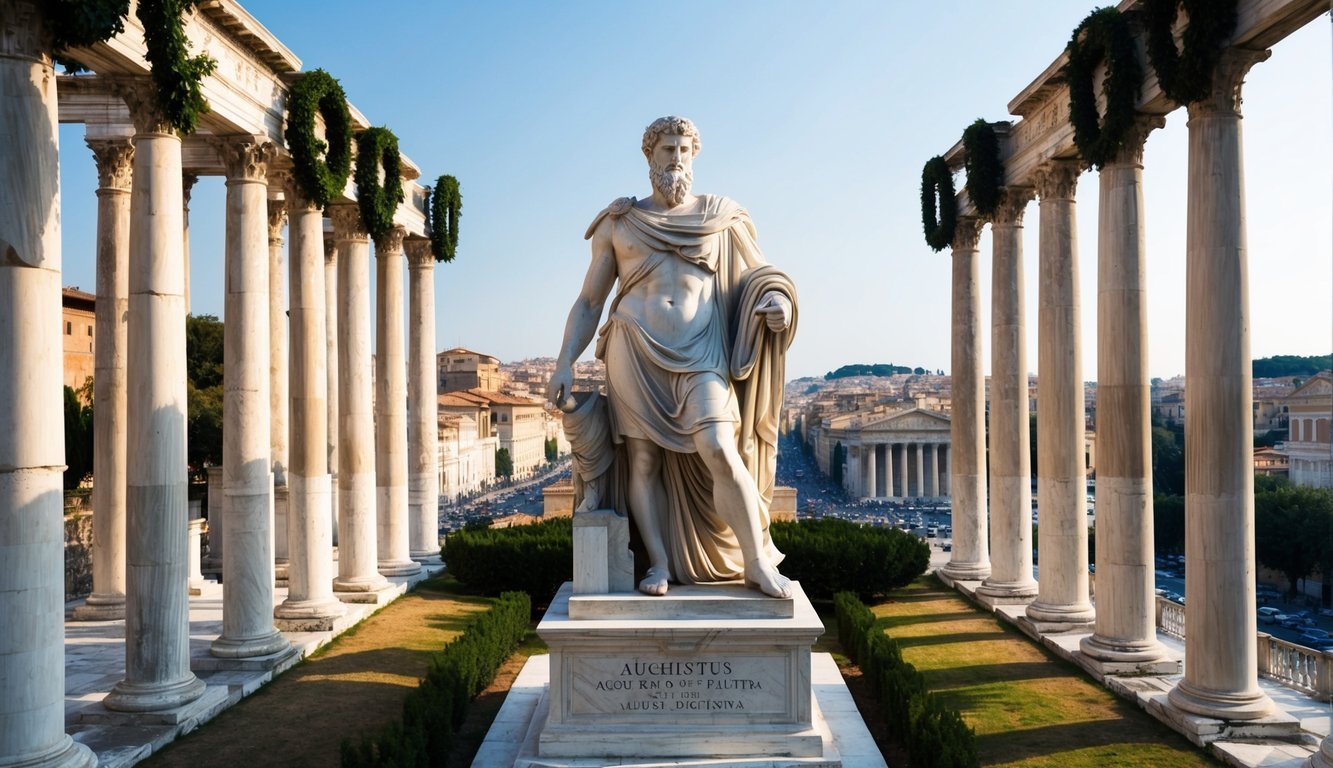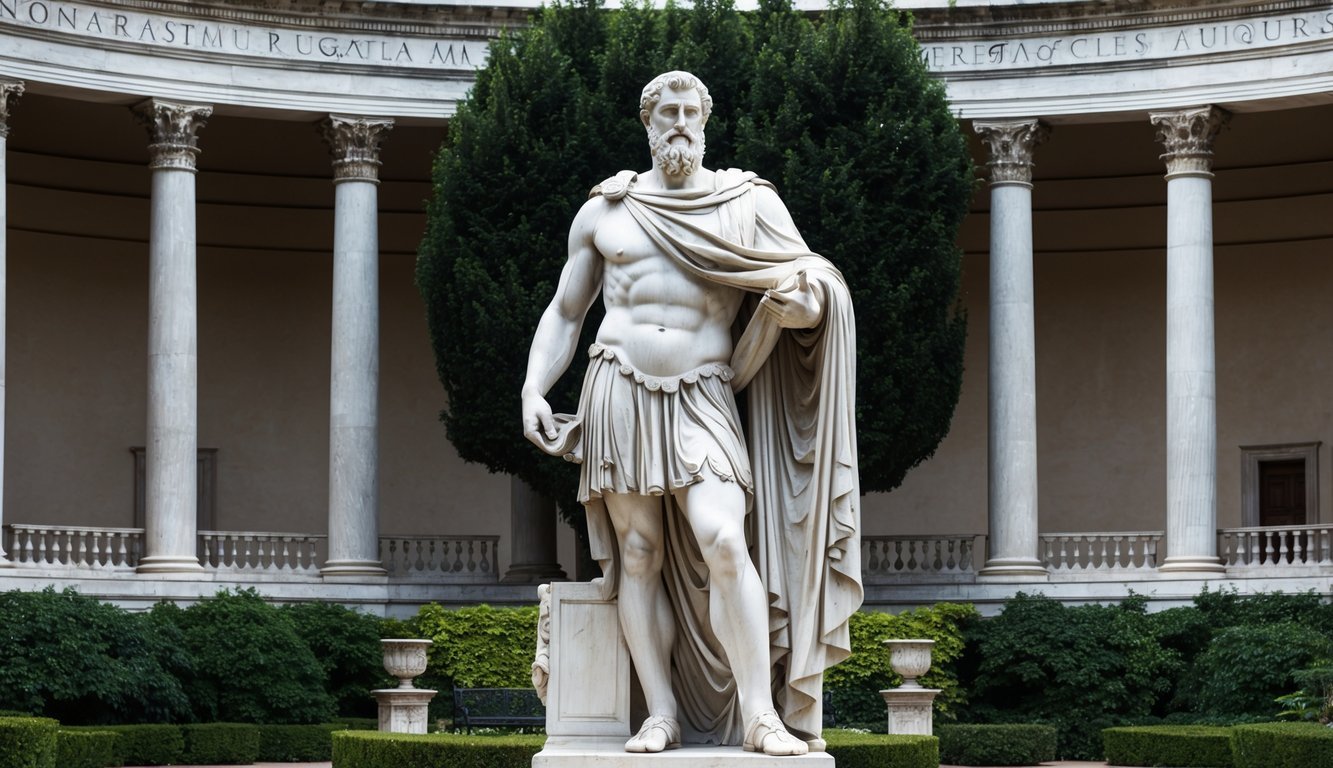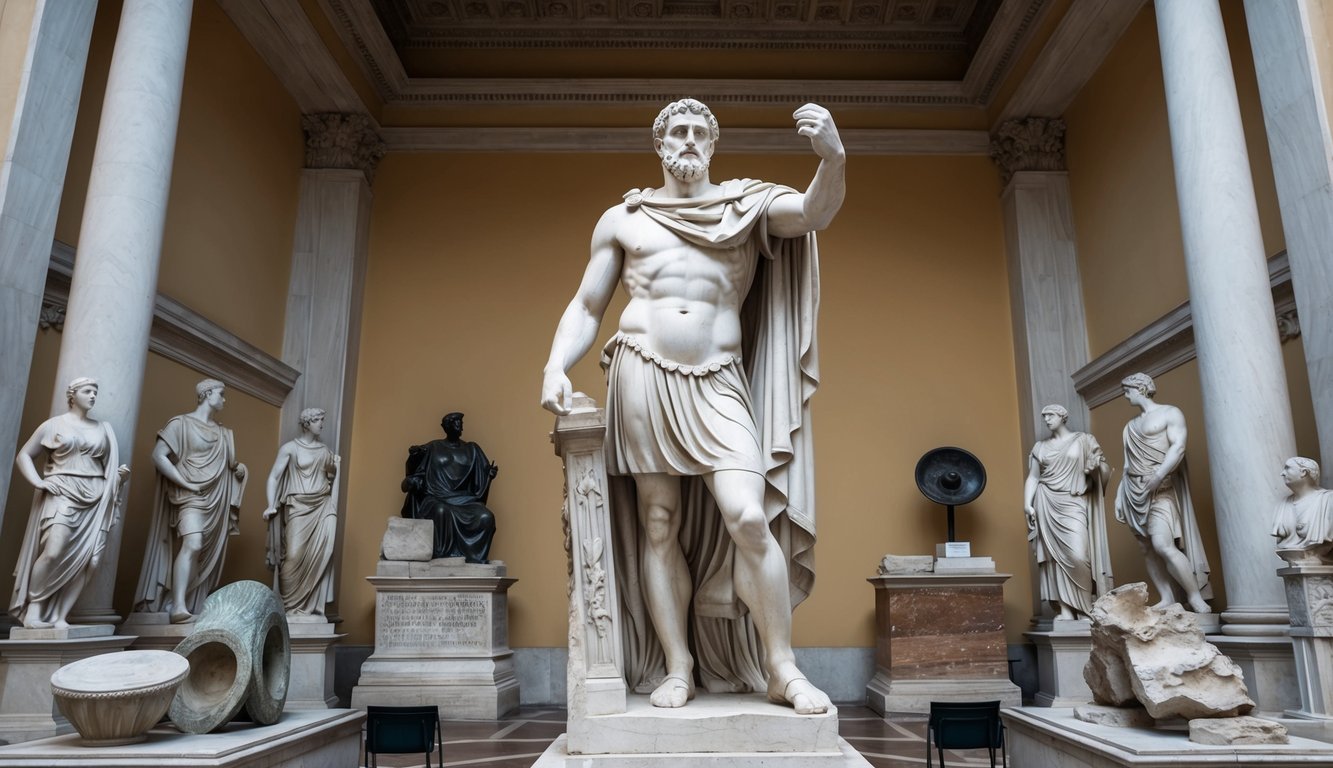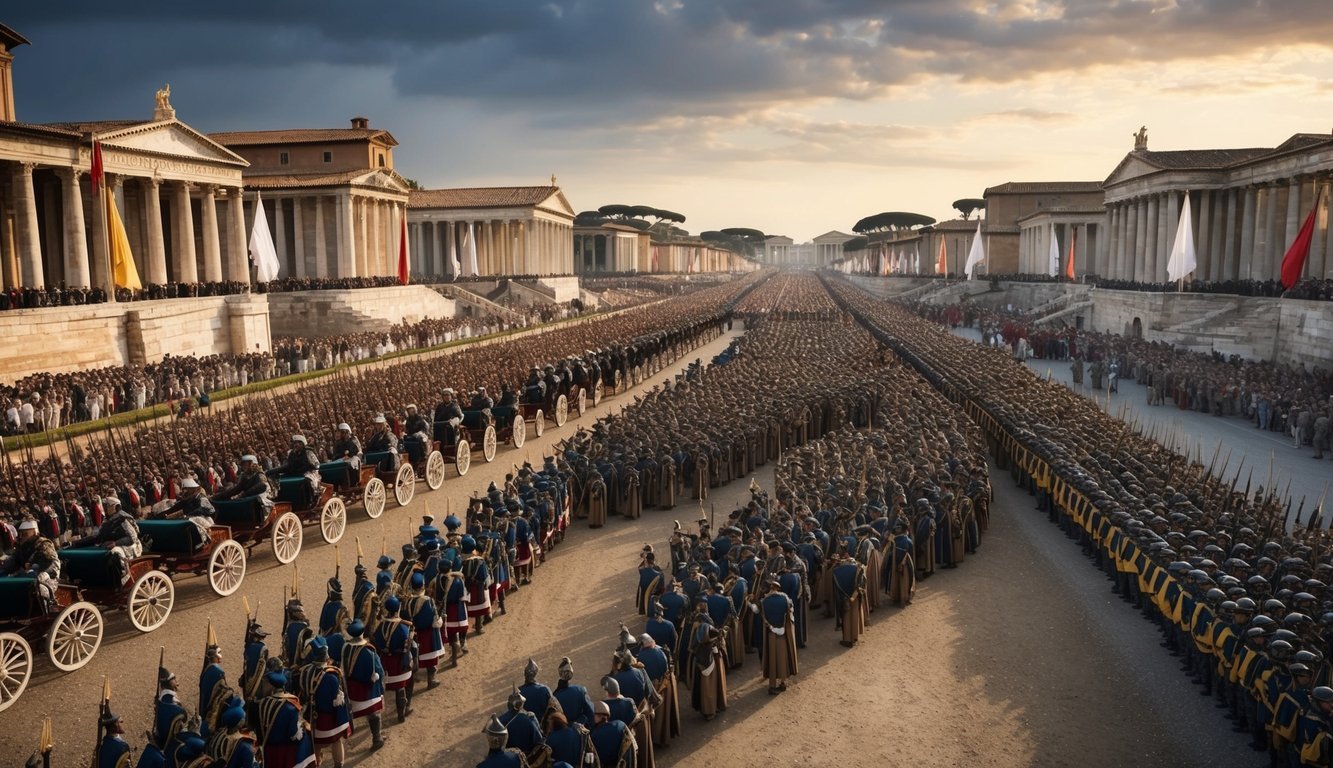Physical Address
304 North Cardinal St.
Dorchester Center, MA 02124
Physical Address
304 North Cardinal St.
Dorchester Center, MA 02124
Augustus, originally Gaius Octavius, transformed Rome from a Republic to an Empire, establishing a period of peace known as the Pax Romana and initiating significant cultural reforms.

Augustus, originally known as Gaius Octavius, rose to prominence during a chaotic time in Roman history.
His path truly began in the shadow of Julius Caesar, his great-uncle, and continued through significant events that shaped the Roman Republic’s future.
After Julius Caesar was murdered in 44 BCE, the political landscape completely shifted.
Octavian, only eighteen at the time, inherited Caesar’s name and a portion of his wealth.
It must have been overwhelming, right? With the Republic in disarray, Octavian was thrust into the role of a leader almost by accident.
He had to prove himself quickly, as many saw him just as Caesar’s nephew, not a future ruler.
Still, he capitalized on his inheritance to rally supporters.
He even used powerful rhetoric to position himself as Caesar’s legitimate successor, which helped him enormously in gaining public favor.
In 43 BCE, Octavian teamed up with Mark Antony and Lepidus to form the Second Triumvirate.
It was this alliance that really strengthened his position.
They aimed to avenge Caesar’s death and restore order.
I find it fascinating how they divided control of Rome, with Octavian taking the West.
This move wasn’t without challenges; trust was fragile, and personal ambitions often clashed.
But through shrewd political maneuvers, Octavian solidified his influence.
This alliance also allowed him to eliminate enemies, showing how ruthless Roman politics could be.
The pinnacle of Octavian’s rise came during the Battle of Actium in 31 BCE.
Facing Antony and Cleopatra, the stakes couldn’t have been higher.
Honestly, I get a chill thinking about it.
The naval battle was a decisive conflict that would change everything.
Octavian’s forces, led by Agrippa, outmaneuvered Antony’s fleet.
After a fierce clash, Antony and Cleopatra were defeated, leading to their eventual suicides.
With this victory, Octavian became the undisputed ruler of Rome.
It’s incredible how one battle could shape the destiny of a nation.

Augustus laid the groundwork for an empire that changed the course of history.
His approach connected the might of military power with the careful manipulation of the Senate.
He not only created the structure of what we now call the Principate but also touched ordinary lives through his ambitious public works projects.
So, let’s talk about how Augustus really shifted things in Rome.
After years of civil war, he realized that a strong, centralized leadership was needed.
By claiming the title of “Princeps,” or first citizen, he smartly avoided the term “king,” which had a bad rap in Roman culture.
It’s fascinating how he managed to balance authority with a nod to the Republic.
He maintained close ties with the Senate while simultaneously keeping the army loyal to him.
I sometimes wonder how he did that, honestly.
His genius lay in making the imperial power feel like a natural extension of the Republican ideals that once defined Rome.
The transformation from Republic to Empire was no small feat.
Augustus used both military strength and political finesse to accomplish this.
He had the mighty Praetorian Guard, which acted as his personal army.
This was key for keeping the peace and protecting his rule.
Augustus’ reforms also extended to the provinces, allowing for a more effective administration.
He combined military might with a more stable governance structure.
I think it’s interesting how he made the army a pillar of the new order, much different from their earlier roles during the Republic.
Plus, he created the Pax Romana, a long period of peace that helped solidify his control.
Augustus understood that symbols matter.
He set out to beautify Rome while also ensuring that public works served practical purposes.
The Forum of Augustus and the Temple of Mars exemplified his vision, combining architecture with propaganda.
I can only imagine how inspiring it must’ve felt to see those structures rising up.
The Ara Pacis, or Altar of Peace, celebrated the peace he brought, while also showcasing the divine favor he claimed.
Honestly, it’s remarkable how these projects weren’t just for show; they connected Romans to a greater story, to the empire.
It shows how powerful a well-crafted image can be in shaping history.

Augustus left a deep mark on the Roman world that shaped its future for generations to come.
His era, often referred to as the Augustan Age, was characterized by reforms and a significant shift in leadership.
The way power transitioned in his family and the reverence for his legacy played crucial roles in Roman history.
The Augustan Age, or Pax Romana, was a period of peace and stability across the empire.
Augustus managed to bring an end to decades of civil war, and it makes me wonder about how that affected everyday Roman life.
With vibrant arts, improved infrastructure, and trade flourished, it was a golden time.
Augustus even organized the Julian calendar, giving people a sense of order in their lives.
This peace allowed the arts to thrive; poets like Virgil and Horace created works still celebrated today.
Can you imagine living in a time when art flourished and order made life predictable? It’s pretty fascinating.
Augustus faced the challenge of succession early on.
He didn’t have a clear plan at first, which is wild considering how controlling he was in many aspects.
His stepson Tiberius eventually became his successor, but not without drama.
Augustus also groomed other family members like Marcellus and Julia, his daughter, to hold significant roles.
Their fates varied; Marcellus died young, and Julia faced exile.
It’s not easy to think about how personal and political lives intertwined—imagine the pressure on them! The family ties were complex, and they reflect how Augustus balanced familiarity with the harsh realities of politics.
Augustus was not just a ruler; he became a symbol.
After his death in 14 AD, he was deified, which was a huge deal in Roman culture.
People honored him through monuments, like the Altar of Peace, celebrating his contributions.
They saw him as a figure of divine order who brought prosperity.
His image continued in coins and statues, ensuring he was remembered for ages.
In the Greco-Roman world, this kind of reverence was powerful.
It’s intriguing to think about how this shaped the way future leaders were viewed.
Augustus wasn’t just creating a legacy; he was making a whole new standard for leadership.

Augustus had a huge effect on culture during his reign, shaping arts, literature, and public life in Rome.
His leadership led to what’s called the Augustan Revolution, where art and literature flourished alongside important public works.
Let’s dive into how that all came about.
I can’t help but marvel at how Augustus transformed Rome through art.
He saw architecture as a way to show strength.
Temples, public buildings, and decorative works sprang up everywhere.
This was all part of a larger vision—creating a city for the ages.
I think of how the stunning Ara Pacis celebrates peace and prosperity under Augustus.
It’s like he wanted to say, “Look what I’ve done for you!” The visual appeal was all tied to his auctoritas, or authority, which was meant to solidify his power.
Augustus also encouraged artists to reflect Roman values.
I wonder if they felt the weight of that responsibility.
They were expected to promote ideas of duty, family, and tradition.
With all this, they crafted masterpieces that still capture our imagination today.
When it comes to literature, Augustus had his hands in everything.
I mean, can you think of a better way to shape public opinion than through poetry and storytelling? Virgil’s Aeneid is a great example.
It tells the story of Rome’s founding through a hero’s journey.
Honestly, it’s like he was saying, “See? This is how we got here.”
Then there’s Ovid, who added a splash of romance and wit with works like Metamorphoses.
I find it fascinating how he navigated the fine line between pleasing Augustus and expressing himself.
Literature became a tool for propaganda, with patrons like Maecenas supporting writers who promoted the regime’s values.
Horace and Propertius played their parts too, making sure the message was consistent.
All these literary works helped shape Roman society’s views, blending art and culture into something powerful.

Augustus was really focused on strengthening Rome’s borders.
He wanted to protect the empire while also expanding its influence.
Let’s break down how he approached military power and set boundaries.
I find it fascinating how Augustus looked at the frontiers.
He really believed that having strong borders was essential for safety.
He focused on the Rhine, Elbe, and Danube rivers.
These rivers became key markers for protection.
The Roman provinces in places like Hispania were reinforced.
Proconsuls played an important role in this, making sure the local military was efficient.
When Augustus expanded these territories, I think he knew it wasn’t just about more land; it was also about peace and stability.
It’s almost like he was saying, “If we can keep the peace, we can thrive.”
I often marvel at the size and organization of the Roman army during Augustus’ time.
He set up a standing army, which meant there were always soldiers ready to defend the empire.
That was smart, right? This reduced the need for quick recruitment during crises.
Funding this army was tricky sometimes.
Augustus established a military treasury to ensure that soldiers were paid and equipped, keeping morale high.
Regular Roman citizens benefited from this investment because a strong military meant less chaos, which led to better lives for everyone.
Augustus wasn’t just an emperor; he was a complex man.
He had a smart political mind and a flair for drama.
He transformed from a young leader to a revered emperor known for his arrogance but also for his charm.
I wonder what it must’ve been like to deal with so many expectations.
Augustus died in 14 AD at the age of 75.
His health had been declining, and he knew his time was short.
He reportedly urged those around him to consider his life’s work and legacy.
The end of his life raises questions about how he viewed his own rule, don’t you think?
Augustus had a mixed legacy in the eyes of the people.
Some saw him as a stabilizing force who brought peace and prosperity.
Others felt he wielded too much power.
It’s fascinating to think about how public opinion can change over time, especially for someone so influential.